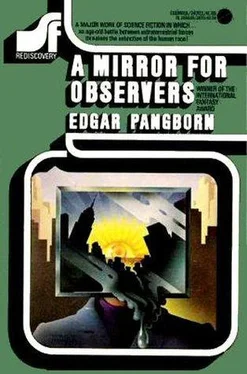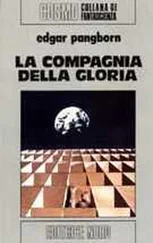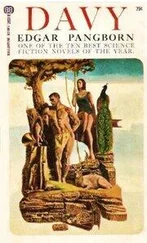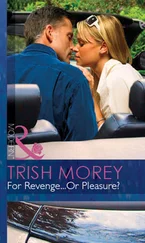“Don’t,” said Sharon, and slid her hand over his eyes.
“Well, it didn’t happen,” said Abraham, for her sake. “So far as today is concerned, it didn’t happen.” She bent down until her tumbling hair hid his face, to whisper something that they thought was none of my business; no doubt something to do with the hour when they left me in a contemplation that looked like human sleepiness, and strolled away into the woods. They are very sweet and natural children, when civilization relaxes its grip on them. Capable of unspoken understanding, too — that should help, if it turns out that they have years together and not just a few bright moments snatched before the climax of a world disaster. It seemed to me that he was following a train of thought parallel to mine, for presently he said: “Will, assuming nothing happened when Walker threw that thing — assuming any of us can have such a thing as another slice of, say, forty or fifty years — what about my forty or fifty? I’m thinking about work. This blue-eyed lady’s got no such problem: she already knows what she can do. And it looks to me as if most people had no such problem: a few have a very plain call to one kind of achievement or another, and the big majority just think of work as an unavoidable unpleasantness, something to be got out of the way so that they can play at nothing in particular, if they can’t find some means of dodging it altogether — which is no good for me, but if I have a call to anything, damn it, it usually sounds like a hundred voices calling all at once. Locomotive with no rails…. You told me a while ago that you’d bummed around a lot, tried several different things. Ever hit on the one kind of work you really wanted to do? Something that made all the rest a prologue?”
Yes, but I couldn’t say so. Forcing myself back into the human frame of reference, and hastily, I said: “Nothing to offer but a moth-eaten bromide: find out what you can do best and stay with it. Finding out might take awhile. I’m merely passing it back to you.”
He smiled. “Yes, but that might be one of the hard bromides the moths can’t chew. And one finds out by trial and error? Mostly error?”
“Maybe. At twelve you were rather preoccupied by the plague-take-it mysteries we like to wrap up in a bundle named ethics.”
“Yes.” He watched me a long while, his dark eyes hazy. “Yes, I was, Will….”
“And?”
“Yes, I still am. Learning more and knowing less all the time.”
“Oh, after a while you work out a synthesis that holds up to your satisfaction. In your thirties perhaps, if you’re lucky.”
“And to translate preoccupation with ethics into terms of life work?”
“Teach. Write. Preach. Act, though action is always dangerous.”
“Always?” said Sharon.
“Always, unless you can trace out the possible consequences to a pretty large distance. Sometimes you can, with a moderate degree of certainty, enough for practical purposes. If you can’t, then the time-tested actions are — well, safer anyway, as the man in the street has always recognized: not necessarily better of course.”
“I wonder,” said Abraham, “if I’d ever think I knew enough to act.”
“If you don’t, then study all your life and talk a little when you believe you have something to say.”
He chuckled and threw a handful of pine needles at me. Sharon framed his head in her hands and moved it from side to side, not very playfully. “I’d like to take you home with me this evening. You haven’t met Mother Sophia yet.” I could see her face as he did not. She was thinking not only of Mother Sophia but of the piano. “How long, Abe, since you’ve done any painting?”
He hesitated; there was a frown that she rubbed away with a finger. “Quite a while, Sharon.”
“Maybe,” I suggested, “it doesn’t hitch up closely enough to a preoccupation with ethics?”
“Maybe.” He was startled and interested. “You can preach in oils, but—”
“Not really,” said Sharon. “Propaganda is bad art.”
“Aren’t you thinking in terms of music, though?”
“No. In music the problem just doesn’t exist. You don’t even start looking for propaganda in music unless your head’s already addled.”
“Yes. But in art — well, Daumier, Goya, Hogarth—”
“They live,” said Sharon, “because they were good artists. If their social ideas had been the kind we don’t happen to like in the twentieth century, their work would last just the same. Cellini was a louse. The piety of Blake and El Greco almost doesn’t exist nowadays. Their work does.”
“I think you’re right,” said Abraham after a while. “I think Will is right too. Painting isn’t enough for a frustrated moralist late of reform school.”
Sharon winced and tightened her fingers, but Abraham was still smiling. I thought I had heard something she missed. I said: “Abe, that’s the first time I’ve heard you speak of the past without bitterness.”
He twisted his head to look up at his sweetheart almost with merriment, reminding her, I think, to share the memory of some words they must have spoken earlier. “I don’t think I have any, Will. Not any more.”
“Not even for Dr. Hodding and the men who bought him?”
Abraham murmured: “Bound on the wheel.” He sat up then and pulled Sharon into the hollow of his arm, kissing her hair, sensing that for the moment she wanted to be the sheltered one.
“So now the boy is a Buddhist,” said Sharon.
“Of course. Buddhist, Taoist, Confucian, Mohammedan—”
“One moment. One wife will be quite enough—”
“Hoy! Mohammedan, Christian, Socratic, Hindu—”
“Okay, only kind of hard for a girl to keep up with on a Sunday afternoon, and I still say—”
“You get used to it,” said Abraham. “We dispense with the veil. It merely means you have to take your shoes off when you go through the house in order to reach the bo tree in the back yard.”
I said: “You forgot Mithra.”
“Tradesmen’s entrance,” said Abraham. “Plenty room. Not forgetting the Greek Pantheon, which can use the front door any time.” He stuck out his tongue at me, not much more than twelve years old. “Syncretism in North Jersey yet! Will, this bottle still has life in it.”
We killed it without help from Sharon, who didn’t want to move.
But it seemed to make Abraham more sober, not less. He watched me over her drowsy head, and at length he asked: “Do you still have that mirror?”
Dubiously I said: “I’ve always carried it with me, Abraham.”
“So…?”
“And never exactly forgiven myself for letting you see it when you were twelve.” Sharon looked up at him, with questions unspoken. “Since then I’ve looked in it many times.”
“And found…?”
“Oh, if you can stand it, if you turn it often enough this way and that, you can usually find something like the truth you look for. Most people would say it’s only a distortion in the bronze, imagination supplying the rest. I wouldn’t say yes or no to that.”
“Mirror?” said Sharon sleepily.
“Just something I carry around with me. Call it a talisman. It was given me years ago by an archaeologist. A little Cretan hand mirror, Sharon, said to be about seven thousand years old.”
“You see, honey? Just modern stuff after all.”
“Uh-huh,” I said. “Yes, if you’re interested in ethics, you could do worse than think in terms of geological time. Well, Sharon, you can’t find any wave or imperfection in the reflecting surface, but there must be one, for the plague-take-it thing never looks the same twice. I wouldn’t care to have you peep into it unprepared. Usually it doesn’t show your face as other people see it. It might show you very old, or very young. Different. Things you might never have guessed yourself — and who’s to claim there’s any truth in it? A trick. A toy…”
Читать дальше












